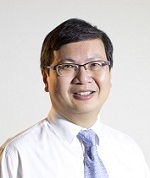 |
| James Yip |
SINGAPORE--The clinical side of orphan drug use has many twists and turns, not the least of which is matching patient ability to pay with the right drug and an openness to understand the dynamics of a "Dallas Buyers Club" approach to use, according to James Yip, a senior consultant and medical clinician who manages patients with pulmonary hypertension at the National University Heart Centre in Singapore.
Yip's perspectives are reinforced by strong support by the Singapore government, including his salary pegged to private practice rates, for his clinical work.
He has also had time to understand pharmacology specific to the rare condition of patients with forms of pulmonary hypertension, treatable by orphan therapies such as Tracleer (bosentan) by Actelion Pharmaceuticals and/or Bayer AG's novel drug Adempas (riociguat) for both inoperable chronic-thromboembolic pulmonary hypertension (CTEPH), and pulmonary arterial hypertension (PAH). Or the generic forms of Pfizer's ($PFE) Viagra (sildenafil) or Eli Lilly's ($LLY) Cialis (tadalafil).
It also casts a light on other therapies such as cures for hepatitis C that while expensive, give patients a second shot. Access has been a key focus of drugs in this space with companies such as Gilead ($GILD) going to great lengths in markets like India to provide less expensive versions in a market where reimbursement is non-existent for such therapies and private insurance cover would be rare.
For Yip in Singapore, his experience with patients from around the region puts him at the nexus of drug companies and funding, where weighing costs and benefits is a daily chore and patients call from as far afield as Bangladesh or as close as the National University of Singapore.
Drug approvals in Singapore for orphan candidates are handled by the Health Services Authority, often taking a lead from the U.S. FDA and European Medicines Agency. But there also cases called name patient basis--where the doctor can advise a patient of the "best hope therapy" and gain consent to use therapies approved elsewhere.
The choices are not simple where one treatment for Tracleer could cost roughly S$6,000 a month, or Adempas, about S$3,000 a month--for chronic care over years--to S$300 a month for sildenafil to S$600 a month for tadalafil with varied doses per day. One option is to defray some cost through patient participation in clinical trials.
"It doesn't take a lot of patients to run the trials for orphan drugs," Yip said in a Feb. 16 interview at NUHS. He added that he has been involved in four to 5 trials that while double blind, saw patients initially on a monotherapy at the start but gain access to the trial medicine in the rollover phase.
His position as well helps him evaluate changes in dose levels for both cost and efficacy standpoints--as well as witness patients who on their own form a sort of buyers' club to get generic versions of medicines from India and other countries such as Thailand. Some patients also alternate between the generic and original in dosing to save cost but have the assurance of taking the original.
"I don't endorse that, but I see it and it goes to the heart on whether the treatment is sustainable among many patients," Yip said. In Singapore, he can keep some patients in the system by looking at a mix of therapies at a cost level in line with dialysis for kidney failure at about S$1,500 a month.
"In Singapore, we are grateful to have a Medication Assistance Fund Plus (MAF-Plus) which is a competitive funding given on a case-by-case basis for year, for medications that are expensive but have met strict rigors of evidence based therapy," Yip said. "This peer review process helps benefit the greatest number of patients for the fixed funding given to the hospital yearly for these expensive drugs."
For his part, as a clinician in demand, the stakes are high to see if the work will be carried forward. "Anyone looking at these rare diseases as a doctor has to be a champion for their patients. I never intended to train in pulmonary hypertension, but patients fell in my lap."
But he notes that his work has enabled a more formal clinical training program to grow at NUH and in Singapore, cementing its regional role where access to novel therapies and trained clinicians are available. That's a big deal in Southeast Asia where demand for such services is at a premium.
That brings Yip back to the Dallas Buyers Club analogy in the use of treatments by a wide range of patients in income and lifestyle as well as geography. "We need to look at what's best overall, and patient always need hope to carry on," Yip said.